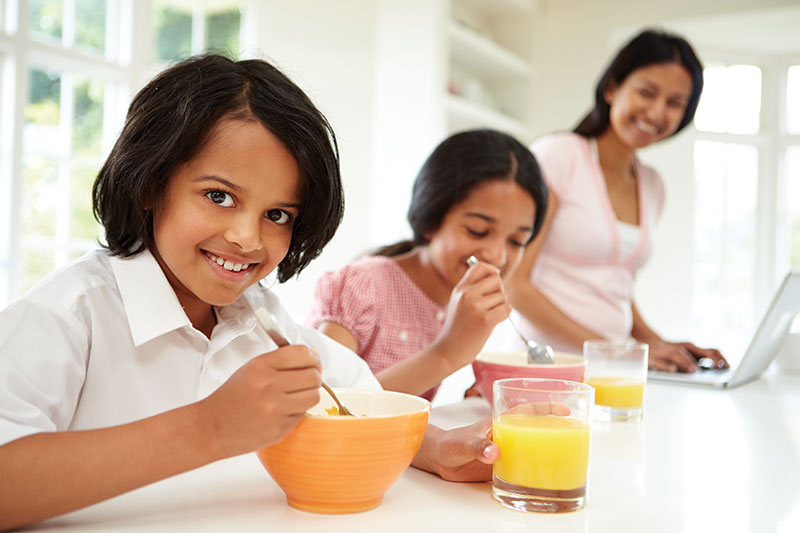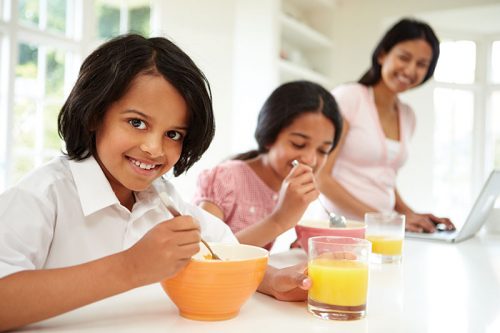Get set for a healthy academic year!
As children countrywide get ready to begin school in June/July, it’s important that parents plan and prepare children for a changed routine and ensure their physical health and well-being through the school year – Dr. Gita Mathai

The summer holidays are over and it’s time for the new school year to begin. As 250 million children countrywide get ready to begin school in June/July, stressed-out parents are struggling to cope financially, emotionally and physically with preparing and equipping children for the new academic year. They are buying school books, uniforms, arranging for children’s commuting, co-curricular and sports activities, preparing study timetables, setting routines and drawing up meal menus. Without planning and preparation, these could become high stress duties for parents.
Therefore it’s important that you plan and prepare children for a changed routine and ensure their physical health and well-being through the school year. Here are my guidelines for parents to ensure a healthy and fulfilling new school year for their children.
Establish a sleep/waking routine. Holidays mean late nights and later mornings. Most parents complain that waking and getting children to school on time is a herculean task after the summer vacation is over. Therefore to minimise stress, it’s important to establish a sleep/waking routine at least a week before school begins. Wake children up at least one to two hours before the school bus is due to arrive. Encourage 20 minutes of aerobic physical activity. Running back and forth in any empty space at home is good. Alternatively getting children to run up the stairs fast and come down slowly is a good exercise to wake up sleepy heads. This 20-minute physical activity sharpens the intellect, improves memory, boosts academic performance, instils discipline and reduces stress.
School-going children require eight to ten hours of sleep. Reducing sleep to study doesn’t necessarily result in better academic outcomes.
Provide a healthy breakfast. Don’t send children to school on an empty stomach. Breakfast is the main meal of the day and essential to kickstart the body’s metabolism. And please note that milk and biscuits are not substitutes for a nutritious cooked breakfast. Traditional Indian breakfast of chapatti, puri, idli or dosa is an excellent source of non-refined carbohydrates which provide young children a continuous source of energy through the day. If preparing these meals is onerous responsibility, opt for porridge made of broken wheat, rice and ragi with milk. Add sugar and a few dry fruits and nuts. Chickpeas and soya chunks are also good alternatives. For non-vegetarians, an egg is an excellent breakfast meal providing 12 gm of protein.
Immunity check. Ensure your child’s immunisation card is checked by a paediatrician to confirm all vaccinations and boosters are up-to-date. The immunisation schedule is complex with combined shots at varying intervals between doses and boosters which finally finish in a child’s 16th year.
Please note that school classrooms, playgrounds and other spaces are also breeding grounds for germs and bacteria and that children can easily contract contagious diseases. Many child-specific/common ailments such as jaundice, typhoid, chicken pox, measles, German measles and mumps are preventable with timely immunisation.
Unimmunised children are quite likely to contract these diseases. On average, children lose out 14-21 school days annually because of sickness with 10 percent of school-going children requiring hospitalisation.
Dental and vision health. It’s common for children to develop dental caries which prevents them from eating well. Vision defects and subtle hearing loss can also adversely affect academic performance. It may be a simple blocked ear, the result of wax build-up or something more serious. Poor eyesight uncorrected by prescription glasses may result in children experiencing difficulty in reading alphabets, numbers and copying notes from the blackboard. Organise dental, eye and ear check-ups for children before school starts every year.
Choose the right school bag. Choose a school bag which is comfortable and doesn’t strain your child’s back. It should preferably be a backpack with padded straps that fit well on both shoulders, and the length of the shoulder straps should be adjustable to match the height of children. The weight of the school bag should not be more than 10 percent of the total weight of children. Heavier bags can result in faulty posture and backaches.
Provide healthy lunch and snacks. The school lunch should comprise rice or chappatis and not fast food such as instant noodles. For snacks, opt for home-cooked foods such as carrot halwa, peanut barfi, kesari, bhajis, samosas and bondas. Carbohydrate intensive, salted, preservative-laden packaged snacks should be avoided. For children who rush to tuition classes straight after school, a banana is an ideal snack before the grind begins. All children must carry their own water bottles to school.
School uniforms/shoes/etc. It’s also important to choose the school uniform carefully. The uniform material should be 60 percent cotton and 40 percent polyester to suit India’s hot/humid climate. Children’s undergarments and socks should be pure cotton and washed daily. Sweaty socks air-dried and worn again can cause fungal infections of the feet. Shoes should be of natural material such as leather or cloth. Damaged, torn, worn out, ill-fitting shoes could irreparably damage growing feet.
Choose safe school transport. Arrange for safe and comfortable school transport. Teach children about basic traffic rules and etiquette.
Restrict television viewing. TV watching for school-going children should be restricted to two hours on Saturdays (one movie). Watching two-three hours of television daily during school days adversely affects children’s attention and recall capabilities.
Get involved in school activities. Attend parent-teacher meetings regularly as physical presence of parents prevents bullying, ragging and victimisation of children. Volunteer to help with annual days, plays and sports days.
Most important, have realistic expectations of your children. All children have differing talents and interests. The role of parents is to discover and nurture their children’s special talents and provide a supporting and enabling home environment to help children derive the full benefit of school.
WHO vaccination schedule
The World Health Organisation recommends the following vaccinations:
• At birth: BCG (Bacillus Calmette-Guérin), Hep B (Hepatitis B), OPV (Oral Polio Vaccine)
• 6 weeks: DPT (Diphtheria Pertussis Tetanus), OPV/IPV (Injectable Polio Vaccine), Hep B, Hib (H Influenza), pneumococcal vaccine
• 10 weeks: DPT, OPV/IPV, Hib, pneumococcal vaccine
• 14 weeks: DPT, OPV/IPV Hep B, Hib, pneumococcal vaccine
• After 15 weeks: Rotavirus two doses orally, four weeks apart
• 6 months: Flu vaccine — two doses four weeks apart
• 10 months: Measles
• After 12 months: Varicella vaccine (chicken pox)
• 15 months: MMR (Measles Mumps Rubella)
• 18 months: DPT, OPV /pneumococcal vaccine booster
• 2 years: Typhoid vaccine
• After 2 years: Hep A (Hepatitis A); two doses four to six months apart
• 5 years: DPT, OPV, Hep B booster/MMR/Varicella
• 9-11 years: HPV (Human papillovirus) three doses 0, 28 days, six months
• 10 years: dT (dT-diphtheria/ tetanus dual antigen)/OPV /Varicella
• 16 years: dT/OPV, flu vaccine every year from October to March
• 65 years: Pneumococcal vaccine
















Add comment